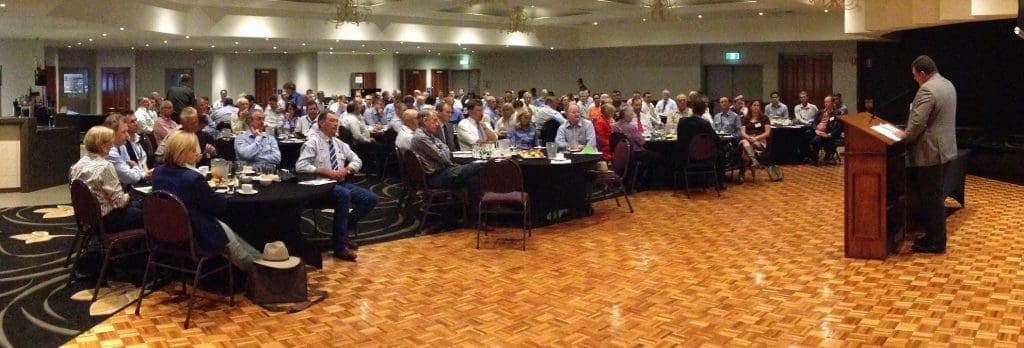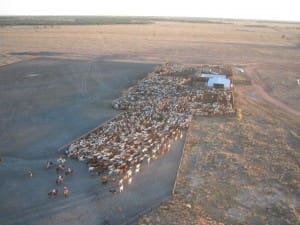WHEN the first question at Wednesday’s McCullough Robertson Beef 2015 breakfast called for his views on the market outlook, AACo managing director Jason Strong grinned back and said one of the things he had sworn not to talk about were cattle prices.
But in accepting the challenge from the firm’s Rodney Bell, he gave an answer that provided further insights into AACo’s reasons for developing customer-focused supply chains which are aimed at capturing better margins from high value markets.
His answer was that yes, cattle prices “will probably rise from here”, but for the wrong reasons: tight supply versus more sustainable, value-driven demand.
The ‘wrong’ reason because while ever margins shifted disproportionately up and down the supply chain, the industry would have difficulty getting producers to commit to producing the type product that consumers want.”
Production decisions driven by farmgate prices rarely contributed to the highest value for the consumer, which the industry had to deliver to capture the highest value for its product.
Mr Strong said AACo was focusing on tapping into the global premium market by operating “at the very top of the price pyramid in everything that we do”.
“That is why at AACo we redefined the way we think of ourselves.
“We stopped thinking of ourselves as a pastoral company. We have made the shift to being a vertically integrated beef company.
“We seek out customers who demand the highest quality product and we deliver consistency.”
As has been widely reported the company divided its business into three major and distinct supply chains last year – Grass, Grain and Northern Beef – in order to meet the specific needs of different customers.
The grain supply chain produces Wagyu and short-fed cattle and focuses on customers who are high-end international importers and distributors servicing some of the best restaurants, hotels and premium supermarkets in the world.
The grass supply chain provides the raw material to the grass supply chain, and also to the live export market.
The Northern Beef supply chain produces manufacturing beef through AA Co’s recently opened Livingstone Abattoir near Darwin abattoir. This chain’s typical is a quick-service restaurant “which doesn’t just want ground beef, but beef that was source-verified, traceable and had a story behind it.”
The supply chains have now been in place for around a year, and Mr Strong delivered a frank assessment and scorecard as to how he believed each was travelling.
The grainfed side of the business was achieving increased prices, was catching a good margin and was building fantastic customers, earning “probably a 7-8 out of 10”.
The grassfed side posed a greater challenge because of the greater distance between the company’s grassfed operations and its end-customers, which posed greater challenges in establishing relationships with our end users. “But we do see information back about the performance of our cattle, so that supply chain is probably a 6 out of 10, so a pass,” he said.
Northern Beef was a long-term investment focus and a very new business which was providing opportunities for both AACo and others in the north, earning a scorecard so far “of 4 out of 10”, Mr Strong said.
“So overall, we’re a bit better than a pass but we have a way to go,” he said.
He said the focus for Australia’s biggest cattle producing company was no longer about having the biggest herd, or the highest volume of sales.
“It is about knowing who your end customer is, understanding their needs and producing specifically for that,” he said.
“We want every animal in our business we own to be identified and allocated to an end customer.
“And once we start doing that it allows us to make much better decisions around our investment and our animals as far as what we might produce as an end product.”
Earlier in his speech Mr Strong compared the mining industry and agriculture to highlight the often under appreciated importance of the latter.
Consider, he said, that the beef industry contributes 1pc the nation’s gross domestic product.
At the height of the mining boom, coal was producing 5pc, but you could easily imagine its contribution was much larger given the amount of media attention it received.
The coal industry employs around 55,000 people, beef 75,000.
And while China may have stopped buying as much coal, they still have an insatiable demand for food and particularly beef.
“So we are a very important industry to the nation,” he reminded the audience.
Don’t forget markets beyond Asia
Just as the media gave disproportionate attention to the coal’s contribution to GDP, he also urged against letting our entire focus in the beef industry concentrate on Asia.
While projected demand growth in the region was impossible to ignore, focusing too heavily on Asia risked missing important growth opportunities in other markets.
Reaching the ‘global mega middle class’ was the challenge.
“It (Asia) is an incredibly important market for us but I actually see more important markets for us to have an opportunity to grow and further develop our industry as a global premium market – markets like the US, Europe, in the Middle East.
“By 2050 the total global middle class will grow substantially. The fastest growth will occur in the next five years.
“There will be an extra 3 billion more people joining the middle class, and their demand for animal based protein will increase by 60pc.
“As a sector we can’t hope to supply even a fraction of the basic needs of these markets.
“But what we do have is a really high quality product, the finest beef in the world.
“Beef that people in these markets – this emerging mega middle class – will create demand and increased value for the sort of product that we produce.
“That is now where the focus is for our company.”






HAVE YOUR SAY